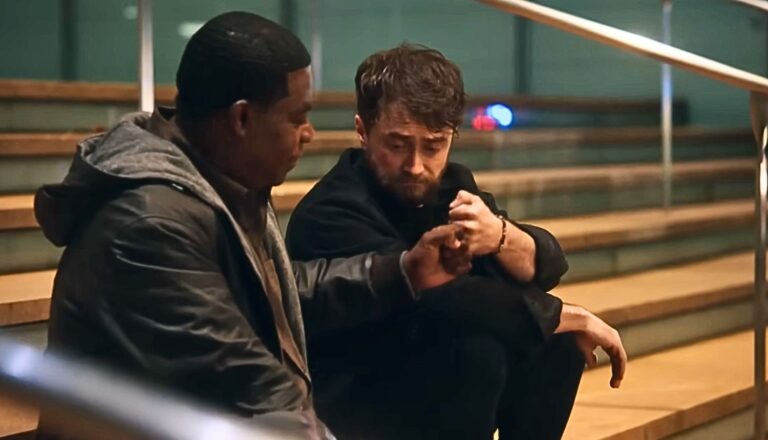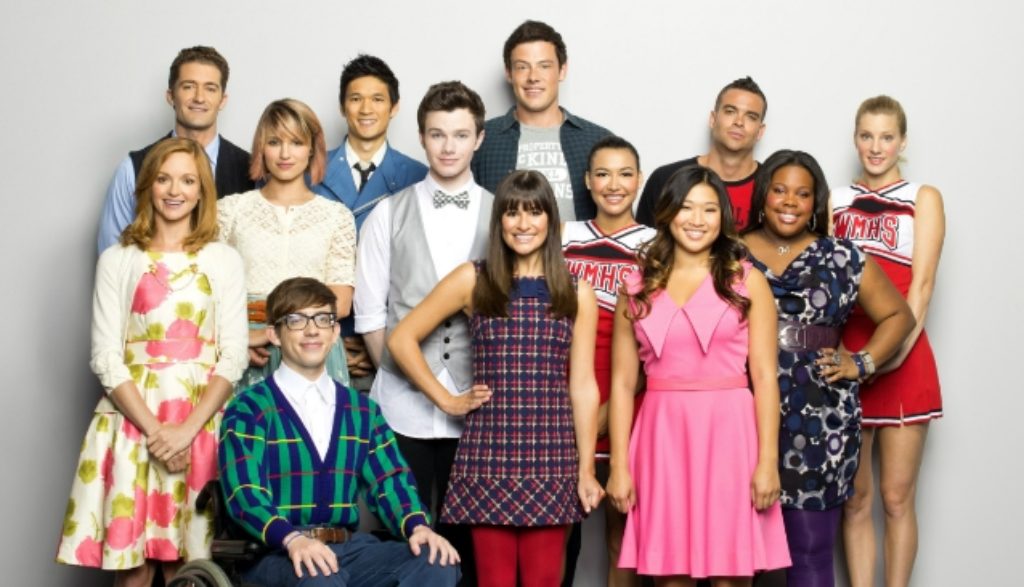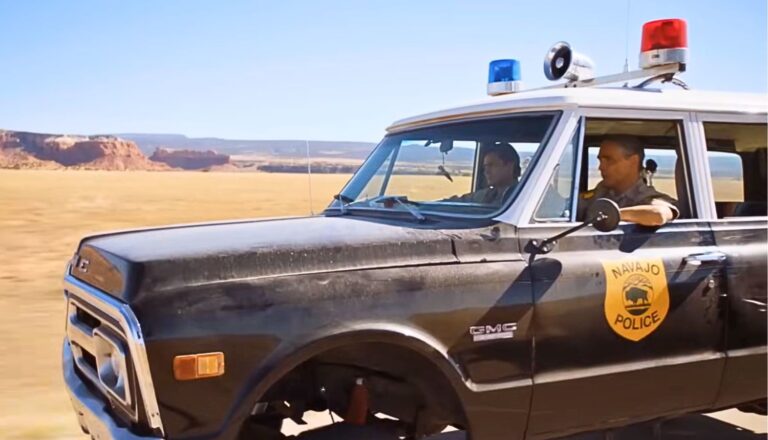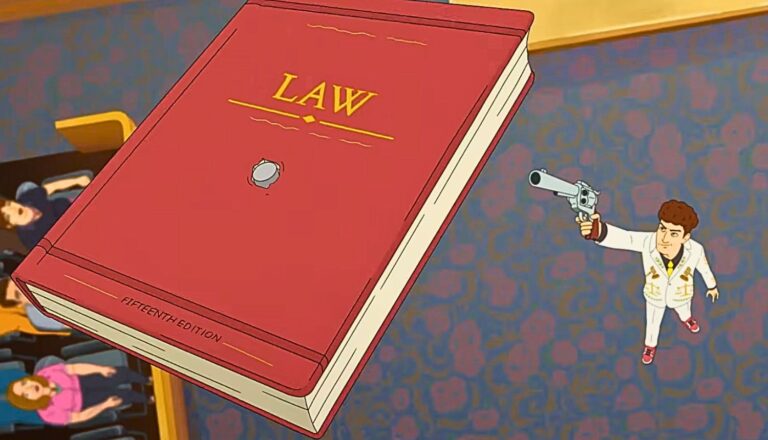
The Fall and Rise of Reggie Dinkins
‘The Fall and Rise of Reggie Dinkins’ is a mockumentary speaking to second chances—though audiences may not want to give it a first chance.

It’s been quite a long while now since Spanish teacher Will Schuester danced in to lead William McKinley High School’s glee club. Most of the original gleesters—Rachel, Kurt, Mercedes, etc.—have moved on to brighter lights and bigger cities. But time stands still on Netflix, and the whole song and dance is still going on. The hopes and dreams of the club’s cadre of newcomers can’t be quashed under Sue Sylvester’s heel like a wayward grape. The melody can’t be silenced by the shrill scream of negativity or fear or, let’s just say it, reality. No, the show will go on.
Just as the lives of McKinley’s New Directions members had their ups and downs, so did Fox’s musical dramedy. It began with a drum roll in 2009, becoming the buzziest and, in some circles, the most beloved of shows. It was never a ratings blockbuster, but critics liked it, and fans—drawn in by its toe-tapping tunes, audacious optimism, messages of inclusion and Sue Sylvester’s crackling wit—adored it. And even if there were fewer and fewer of those so-called Gleeks making L’s with their fingers each passing season, the musical series still drew some high-wattage guest stars, including Neil Patrick Harris and Gwyneth Paltrow. Then Glee went through its most difficult stretch when Cory Monteith, who played Finn Hudson, died of a drug overdose. It was a poignant reminder, even within the show, that dreams don’t always come true.
Let’s give Glee credit for what it does well. It showcases talented kids who love singing. Some of the lessons it offers are encouraging. Kids’ relationships with their parents and other authority figures are often positive. And throughout, all of them are pushed to follow their dreams and be themselves—good advice, as far as it goes.
But in the context of 21st-century America, the phrase “be yourself” is loaded with some seriously political, social and spiritual baggage. Glee is most famous for being a longtime primetime advocate of homosexual expression among teens. Newsweek’s Ramin Setodeh, in fact, has called Glee “TV’s gayest product since Richard Simmons.”
It only got gay-er over time, according to Slate’s June Thomas, who called the final season “the gayest thing I’ve ever seen on television—and ever expect to see. The TV version of Lima, Ohio, is a fantasy world where sexual minorities rule the roost and heterosexuals are background players, coming into focus only when they interact with queer characters.” She goes on to say that “Glee did more to normalize homosexuality than any other show in TV history, perhaps more than any other mainstream work of art.”
It also wallows in, like creator Ryan Murphy told the Los Angeles Times, “the cultural phenomenon that anybody can be a star overnight on MySpace or YouTube.” Murphy continues, “There are all these different ways that you can be celebrated quickly and instantly now for your talent or lack thereof, and the show also deals with that.” How? It comedically spoofs those dreams of instant fame … while earnestly encouraging viewers to go ahead and seek out the spotlight anyway.
It embraces outcasts and tells them they are, indeed, special. Then, as The New York Times points out, gregariously undercuts those nuggets of goodness, “rounding out the choir with generically good-looking ringers imported from the football team and cheerleading squad, leaving the impression that a show choir—even a cast on a television series about a show choir—can’t sustain itself without an injection of cool kids.”
Glee also suffers from sleazy sexuality and severe sacrilege, and it stumbles—often—over crass gags and strident stereotypes.
(Editor’s Note: Plugged In is rarely able to watch every episode of a given series for review. As such, there’s always a chance that you might see a problem that we didn’t. If you notice content that you feel should be included in our review, send us an email at letters@pluggedin.com, or contact us via Facebook or Instagram, and be sure to let us know the episode number, title and season so that we can check it out.)
The first part of this two-hour series finale flashes back to New Directions’ formative year, as Kurt, Rachel and the rest first meet. Mercedes and Rachel’s rivalry takes flight when Rachel hears Mercedes sing a sincere spiritual in her mostly empty church. Kurt contemplates suicide, and his father encourages him to join a “team” to make friends: That team turns out to be the glee club. In those long-gone days, Kurt wants to tell his father that he’s gay, but stops himself. Tina sings Katie Perry’s same-sex experimentation anthem “I Kissed a Girl” while gesturing to her pelvis during auditions. Artie sings a suggestive version of Ginuwine’s “Pony.” Characters say “a–,” “f-g”, “d–n,” “b–ch” and “h—,” misusing God’s name.
The second hour closes out the present as well as giving us a glimpse of the future, circa 2020, when the world is “not as it is, but as it should be,” we’re told. There, Kurt and Blaine visit the “Harvey Milk School” of preschoolers and talk about acceptance and diversity with the tots, then sing “Daydream Believer” as they roll around on a rainbow flag/rug. Rachel is serving as a surrogate mother to the guys’ unborn child. Mr. Schu is principal of the now arts-focused McKinley High, Mercedes is an international star, and Ms. Sylvester has reconciled with everyone and is serving as Jeb Bush’s vice president. The school auditorium is renamed for Finn. Kurt and Blaine kiss.
Stevie Wonder’s music arrives on the McKinley campus—along with old gleesters Kurt, Mercedes and Mike. Kurt is in town to support his once-estranged father who is getting the results for his latest cancer screening. Mercedes’ record deal falls through because she refuses to pose provocatively for cover photos (a decision she reaches with help from her mother). Artie gets accepted into a prestigious film school but initially plans on turning down the opportunity to stay with his mother. She’s done everything for him, Artie explains. “Seems selfish that the thanks I give is packing up and moving.” Mom insists he go.
Blaine asks Kurt’s father for permission to propose to Kurt. But while Kurt’s dad supports gay marriage, he refuses to give his blessing. They’re too young, he says, and taking vows is a big deal. “You don’t really get what it means to be married,” he says. Blaine and Kurt flirt with each other.
Teens and young adults dance suggestively. Dance getups are a tad revealing. Mercedes invokes Jesus, telling a dancer to not be so shy and let his “light shine.” “Are you going to argue with our Lord and Savior Jesus?” she asks. “I’m Jewish,” the dancer responds. “So was He!” Mercedes says. We hear references to God in song, right along with smoking and scribbling profanity on walls. And speaking of profanity, characters say “h‑‑‑” four or five times and “a‑‑” three times. “B‑‑ch,” and “d‑‑n” pop out once each. God’s name is misused.
Two couples—the heterosexual Rachel and Finn and the homosexual Kurt and Blaine—struggle with whether to go “all the way.” Rachel asks for input from her gal pals, two of whom advise her to wait. “[You’re] talking about losing something you can never get back,” Quinn tells her. But Tina says, “Losing my virginity was a great experience for me. Because I lost it with someone I love.”
That conversation sums up the squishy morality endemic to Glee. It’s stressed that sex is beautiful and virginity should never be squandered, but the idea of waiting until marriage is never mentioned. Thus, the time to have sex is when you’re in love and the moment “feels” right. Ultimately, both couples have sex, and we’re led to believe they feel quite happy about it.
The onscreen encounters themselves are relatively discreet: We see Rachel wearing a shift underneath the covers and watch as Blaine and Kurt rub noses and giggle. We see the couples hold hands. But in other scenes both couples kiss passionately and talk about sex. Kurt and Blaine make out in a car. Masturbation is mentioned, as are condoms. When another boy makes passes at Blaine, the three sneak into a gay bar (with fake IDs) on “Drag Queen Wednesday.” We see men dressed up as female celebrities.
Blaine gets drunk. Swear words include “p‑‑‑,” “h‑‑‑” and “a‑‑.”
Finn’s cheese sandwich comes off the heat with an image of Christ burned onto it. He promptly calls it a “grilled cheesus” and prays to his “cheesy lord” several times. When all of his prayers are answered—including getting to “second base” with his girlfriend—Finn thinks he has a direct line to God. His euphoria doesn’t last long, though. School counselor Emma tells him God doesn’t work through sandwiches, and he quickly feels abandoned and doubtful, launching into a passionate rendition of R.E.M.’s “Losing My Religion.” Then he eats the sandwich.
Sue, meanwhile, protests spiritual songs being sung on public school property. Emma says they’re using them to comfort Kurt, whose father is comatose after a heart attack. Sue says, “Asking someone to believe in a fantasy, however comforting, isn’t a moral thing to do. It’s cruel.” Emma thinks Sue is being arrogant, to which Sue retorts, “It’s as arrogant as telling someone how to believe in God, and if they don’t accept it, no matter how openhearted or honest their dissent, they’re going to hell. Well, that doesn’t sound very Christian, does it?” Emma is silenced.
Kurt says God is “like Santa Claus for adults” and calls Him an “evil dwarf” and a “great spaghetti monster in the sky.” He has a few choice words for Christians, too. The episode wraps with Kurt telling his unconscious dad that he doesn’t believe in God, but he sure believes in him. Cue Joan Osborne’s “What if God Was One of Us.”
Sue Sylvester’s obsession with Madonna motivates her to pay homage to the singer in the form of new Madonna-themed routines for her Cheerios and blasting Madonna tunes 24/7 on the school PA. An inspired Mr. Schuester thinks the girl-power anthems could do the “disrespectful … misogynistic” guys in his group some good, too.
Madonna’s cultural (read: sensual) significance also carries over into the secondary storylines as three of the school’s virginal characters—Rachel, Finn and Ms. Pillsbury—all decide to “do the dirty deed” with their chosen partners. A montage of their caressing preparations plays out to “Like a Virgin.” (It’s implied by a “morning after” shot that Finn goes through with it.)
So the episode plays fast and loose with the idea of respect and taking “control” of your own body. And it ends up saying a few good things about not automatically jumping into the sack. Sentiments range from “Because I’m truly not ready to do this, I’d be betraying myself,” to “The way to get a man to follow you forever—take his virginity” and “Mercedes is black. I’m gay. We make culture.”
The McKinley glee club may have won sectionals, but it’s business as usual back at school. Sue is reinstated after she blackmails the principal by drugging his wine during dinner and getting him in bed, then threatening to tell his wife and his church congregation. Schuester, newly separated from his wife, discovers that his new girlfriend is a virgin. And Finn goes on a date with two cheerleaders.
The girls offer to make out with each other for the pleasure of their shared “date,” and viewers hear veiled sexual references to whipped cream and going braless. A gay choir member tells others he feels “like Lady Gaga.” Still married, we see Schuester lustily make out with two other women (at separate times). Rachel kisses a rival singer. Dolphins are deemed “gay sharks.”
We hear several curses both spoken and sung, including “d‑‑n,” “h‑‑‑” (about 20 times) and misuses of God’s name. Girls lie about the quality of food at a restaurant to get more of it. Backstabbing seems a way of life for these high schoolers; one girl says Rachel’s sweaters make her look “so home school.” Sue slams Sarah Palin for being dumb.
Glee’s getting bolder, braver … and sleazier as the season slides sideways. “Preggers” focuses primarily on the glee club’s swishy tenor, Kurt. Gay stereotypes stack up as he gets caught dancing in a slinky unitard, deceives his dad about having a macho athletic motive and ends up trying out for the football team to cover his lie. Subplots find cheerleader Quinn convincing quarterback Finn that she’s carrying his baby after a make out session in a hot tub—while wearing swimsuits. (We see their “premature” scene from above water level.)
On the musical front, Rachel sings a short but stunning cover of a Celine Dion song, and the entire football team comically dances and sings to Beyoncé. Those musical highlights and a tender expression of unconditional love between Kurt and his dad continue to make the show appealing in some respects. But Glee’s soap opera storylines unblushingly push social and sexual hot buttons.
Schuester decides to take over the glee club when its former leader is fired over allegations of inappropriately touching a student. His recruiting tactics involve begging, pleading, cajoling … and planting marijuana in a kid’s locker. Next stop? Blackmail. And while his wife almost convinces him to give up the club to find a better job for their allegedly growing family, he eventually decides to stick with the glee kids.
Finn, meanwhile, realizes that in spite of pressure from fellow football players, he can’t turn his back on his love for music. And he sticks up for Artie even when it could cost him his social status. The message here is to break from the crowd, stand up to the naysayers and follow your passions.
But this pilot episode also veers into ugly territory: We see quite a bit of Finn while he’s singing in the shower. And his hypocritical, celibacy-touting girlfriend pauses (briefly) during a heavy make out session to pray beneath a picture of Jesus. “Giggles” come from teachers using and selling illegal drugs, androgyny, homosexuality and pedophilia. Rachel talks about how cool it is to have two dads.

Paul Asay has been part of the Plugged In staff since 2007, watching and reviewing roughly 15 quintillion movies and television shows. He’s written for a number of other publications, too, including Time, The Washington Post and Christianity Today. The author of several books, Paul loves to find spirituality in unexpected places, including popular entertainment, and he loves all things superhero. His vices include James Bond films, Mountain Dew and terrible B-grade movies. He’s married, has two children and a neurotic dog, runs marathons on occasion and hopes to someday own his own tuxedo. Feel free to follow him on Twitter @AsayPaul.

After spending more than two decades touring, directing, writing and producing for Christian theater and radio (most recently for Adventures in Odyssey, which he still contributes to), Bob joined the Plugged In staff to help us focus more heavily on video games. He is also one of our primary movie reviewers.
Plugged In by Focus on the Family reviews the world of popular entertainment and gives families the essential tools they need to understand, navigate, and impact the culture. We equip families with Christian reviews of movies, TV shows, music, games, books, and YouTube channels. You’ll find award-winning articles and video discussions that spark intellectual thought, spiritual growth, and a desire to follow the command of Colossians 2:8: “See to it that no one takes you captive through hollow and deceptive philosophy, which depends on human tradition and the basic principles of this world rather than on Christ.”

‘The Fall and Rise of Reggie Dinkins’ is a mockumentary speaking to second chances—though audiences may not want to give it a first chance.

As far as spy thrillers go, The Night Agent is par for the course. But as far as family viewing goes, it might be better to blacklist this one.

AMC+ brings to life a murder-mystery series set in New Mexico, steeped in Navajo ways and filled with dark magic.

‘Strip Law’ is Netflix’s next carbon-copy adult animated comedy whose unoriginality extends even into its crass content.